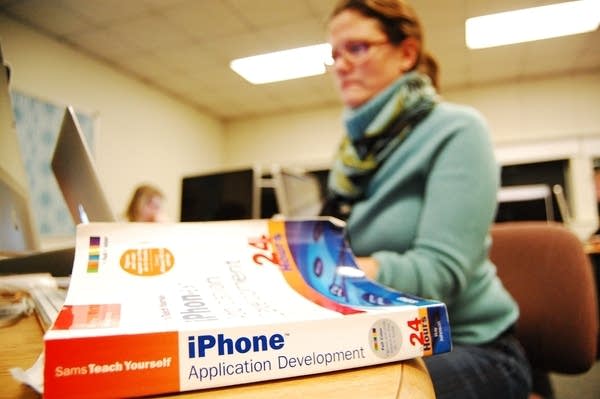Students learn smart phone programming in U of M's new 'apps' class

Have you ever thought about who created all of those applications you've downloaded on your smart phone? Or how they learned how to make those apps? There are plenty of courses, mostly online, that teach app building. Most cover the purely technical side of programming.
The University of Minnesota offered its first app class this year. According to instructors, it's not for hardcore computer programmers, but rather teaches new skills to people passionate about teaching and learning.
Every Wednesday evening a couple dozen graduate students gather in a crowded computer lab on the University campus for a class called "contemporary software tools and development for mobile devices."
Assistant professor Charles Miller and associate professor Aaron Doering developed the class after students, mostly graduate students in education, demanded it.
Create a More Connected Minnesota
MPR News is your trusted resource for the news you need. With your support, MPR News brings accessible, courageous journalism and authentic conversation to everyone - free of paywalls and barriers. Your gift makes a difference.
"Actually, we've been calling it just the 'app class' because that's what students call it, and it just stuck," Miller said.
But the class isn't just a computer course that teaches students how to write endless lines of code to create games, or apps to help remember a grocery list.

Miller said the class delves into what makes a good application for the iPhone and iPad, and explores how apps can be used in learning.
The class isn't likely to give birth to a new generation of programmers who'll make a living cranking out app after app. These students here are working on their advanced degrees in education and learning technologies. Many are teachers.
"What makes the class a great class is they all came in with these apps they want to build specifically for education," Miller said. "They came in with their own passions, their own focus areas, and they know they wanted to design and develop. We're helping them get there."
Student Joan Freese, a website producer at Twin Cities Public Television, works on a national science program called SciGirls.
After 12 weeks of class she's almost done with her first app. Freese calls it "What's a girl 2 do?" It's a quiz of types, geared toward tween girls that asks a series of science-related questions.

"They'll get a score like, 'You like to do math related things.' And then they'll click and see a video of a person who does something with mathematics for a living, a woman who's doing it, because this is specifically to encourage girls," Freese said.
For Freese, learning how to create apps for the iPhone and iPad seemed like a smart career move.
"I think everyone who is in the web world right now knows that this is an important platform and this is where things are going. I'm just trying to learn about it," Freese said.
All of the students in this class need to create an app before the end of the semester. After the class is over, most of them will probably create a few apps specific to their workplace. But it's possible some may never write another program.
Professor Charles Miller said that's OK, because at least they'll be able to help create apps.
"I think it turns into a much better product," ," Miller said. "Because it's always been in the hands of someone who values learning, not in the hands of someone who views it as a quick project."
Professors Miller and Doering plan to teach another apps class at the university next fall. The 40 or so spots in the class are already taken.
The university has yet to iron out one important detail about the class: Who benefits if a student creates a blockbuster app that ends up making lots of money? The student, the university, or both? For now, any profits made through the creation of an app go straight to the student.
Students in the university's app class say at this point they're not planning on getting rich anyway. They just hope someone finds their apps useful.
